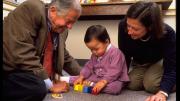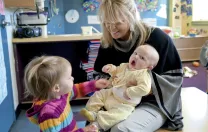T. Berry Brazelton, clinical professor of pediatrics emeritus at Harvard Medical School (HMS) and founder of the Brazelton Touchpoints Center at the HMS-affiliated Children’s Hospital Boston, is known by the public for his television series, What Every Baby Knows, and books such as the now classic Infants and Mothers and the Touchpoints series (See Elizabeth Gudrais’s “Early Learning” from the January-February issue of this magazine). He is equally well-respected among his medical colleagues: he developed an assessment tool that changed doctors’ perceptions of infant behavior and variation in temperament among newborns, and his research has helped reshape societal attitudes about cultural differences in parenting and about the treatment of special-needs children.
Brazelton sat down with Harvard Magazine in May, on his ninety-third birthday.
People say you have a way with babies. Have you always had a knack for communicating with them and understanding their behavior, or was it something you developed over time?
When I was eight years old, my grandmother would give me my six cousins to take care of, for four or six hours at a time. I had to work with these two-, three-, and four-year-olds. I had to learn to get inside their brains and keep them quiet so they wouldn’t beat each other up or hurt each other. I learned from them that I knew how to work with children. That also made me realize that I wanted to be a pediatrician. So I knew by eight years of age what I wanted to be.
As you look back on your life and all your vast experience, what are you proudest of?
I think the Newborn Behavioral Assessment Scale, how it’s changed things, the way babies are treated now. They used to be treated as if they didn’t feel anything. They’d have operations without any anesthesia. Now babies are treated like human beings.
When you had your first child (daughter Kitty Brazelton, now a musician who teaches composition at Bennington College), you were 33 and were already a practicing pediatrician. How did becoming a parent change your perspective on your work?
She was very quiet and hypersensitive. When I’d come into the room, she would withdraw and pull away from me. She wouldn’t pay attention to me until I reduced my voice, quieted down, waited for her to come to me rather than going after her. And I thought, gee—it’s just as difficult to have a quiet child as it is to have a hyperactive one. That led me to write my first book, Infants and Mothers [which explores innate differences in temperament].
One of the foundational principles of the Touchpoints method is that parents are the experts on their own children when it comes to interactions with service providers such as doctors, teachers, and social workers. How did you come up with that insight?
[When I first began practicing as a pediatrician,] I didn’t like parents. I had to learn to like them. But over time, I realized that all along I’d been watching them and imitating them. I realized that they were teaching me how to relate to their child, more than I was teaching them.
The Touchpoints method pays a lot of attention to relational practices. How did you come to understand that how doctors communicate was just as important as what they communicate?
I learned very early that if you tell somebody what to do, they withdraw, set up defenses, and don’t listen. If you wait until the patient finally says to you, “What do you think?” then you have permission to answer their question and say, “What would you like to know from me?” Then they take control and tell you what they need. Waiting for this moment is the hardest thing to do in medicine, because we think it’s going to take a lot of time. The truth is, it takes less time than you’d think. I found, in my own practice, that if I spent an hour in the first two or three visits with patients, then it would never take me more than five or six minutes from then on for each visit. So in spending time at first, I’d cut down on what it took later on.
How does it feel to see the way the Touchpoints ideas have taken off, been put to use in locations all over the world and influenced broad cultural currents?
Fantastic. I realize that I’m very lucky to have lived long enough to see it all happen. Nobody thought any of this was any good until a few years ago. Everybody thought it was nuts. They thought we were wasting our time.
Can you give me an example of inspiring work at a place that uses Touchpoints?
In Waco, Texas [a Touchpoints site since October 2010, aiming to reach children and families in the surrounding county through bringing Touchpoints to numerous agencies and organizations in the public and private nonprofit sectors], they said they couldn’t get the parents to come in and get involved. I said, “Maybe you haven’t tried.” They said, “Well, we thought we had. We told them to come in.” I said, “That’s not the way you reach parents. You use the child to get the parent involved.”
Let me give you an example of how I use a child’s behavior to start up a relationship with a parent. A mother came into my office the other day with her nine-month-old baby—right at the peak of stranger anxiety, where babies show anxiety and fear when they meet a stranger. I think the mother was worried because she knew her child would show me stranger anxiety instead of all of the other behaviors she was proud of. She was stiff as a rod and her baby was clinging to her with her hands and her feet—and I said, “Look at her. Isn’t she lucky to have you to cling to as you walk in my door? She knows you will protect her no matter what.” With that, this mother began to relax, and as the mother began to relax, I could see the baby was relaxing, too. If you want parents involved, this is one way to reach out to them.
In Waco, once the mothers were involved, I said, “What about fathers? Have you worked with them?” They said, “We can’t reach fathers. The kids don’t have any fathers.” Again I said, “Maybe you just haven’t tried.” They said, “We do have one father.” I said, “Well, use him. Let’s work with him. Find out what you’ve done to make him interested, and then he’ll talk about it to the other men.” I talked to them about how they could talk about the child’s behavior to reinforce fathers when they did come in. They began to do that, and now all the fathers come in Waco. It’s just so simple, you wonder why people haven’t done this before. Nothing that we’re doing is very magical or very different. It’s just obvious.
From what I’ve heard, you don’t really believe in the concept of retirement. Is that right?
No, I don’t.
What keeps you so active and so involved?
It’s just so rewarding to have parents come up and greet me and say, “You’ve changed my life and you’ve changed my child’s life.” How could you resist? How could you quit?










